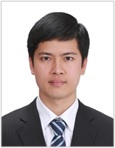
Viet Tu Nguyen
Korea University of Science and Technology, Korea
Title: Selective extraction and separation of platinum group metals from chloride media using phosphonium based ionic liquid
Biography
Biography: Viet Tu Nguyen
Abstract
The present research focused on the use of phosphonium-based ionic liquid to improve the existing solvent extraction process from the environmental benign point of view for the extraction and separation of platinum group metals (PGMs). The studies carried out with [P66614+]Cl–[Cyphos IL 101] diluted in xylene showed the selective extraction of both Pd(II) and Pt(IV) from the solution containing 55 mg/L Pd(II) and 100 mg/L Pt(IV) in 0.1 mol/L HCl by anion exchange mechanism leaving Rh(III) in the raffinate. McCabe-Thiele diagram revealed the quantitative extraction of Pd(II) and Pt(IV) with 0.6 g/L Cyphos IL 101 within two counter-current stages at O/A of 3/2 at 298 K. The species formed in the organic phase at different acidities of the aqueous phases were also determined with Job’s method and elucidated by proton NMR and FTIR spectra. The negative standard enthalpy estimated by Vant’ Hoff equation demonstrated the exothermic nature of extraction for both metals. The Pt(IV) and Pd(II) from the loaded organic was selectively stripped with NaSCN and acidic thiourea solutions respectively. Particularly, two counter-current stages are needed for quantitative stripping of Pt(IV) with 0.1 mol/L NaSCNat O/A of 2; whereas total stripping of Pd(II) with 0.01 mol/L acidic thiourea requires only one stage at O/A of 1. In addition, a series of extraction-stripping up to 5 cycles showed a possible recirculation of used solvent without loss of performance. Simulations of the counter-current modes also revealed the possibility of using phosphonium based ionic liquid for the selective separation and recovery of PGMs from acidic chloride solutions in continuous mode.
